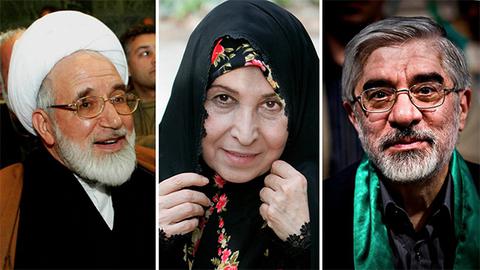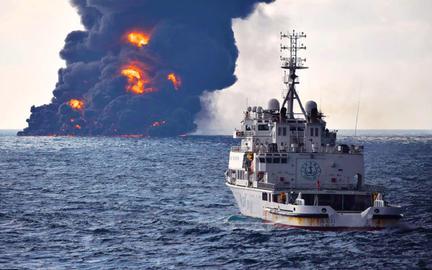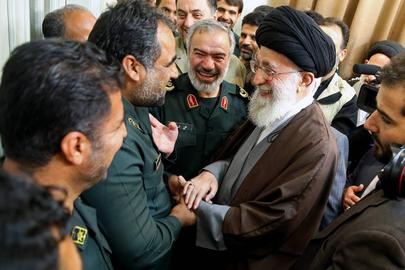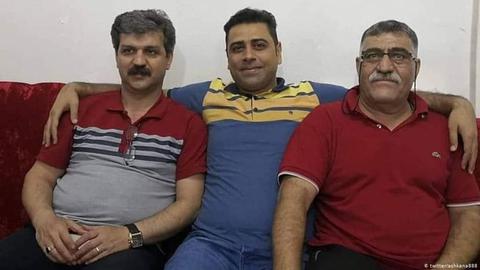The Iranian public is obviously concerned about the likelihood of a military confrontation between Iran and the US.
This concern has especially increased due to a number of recent unexpected events. One example is Donald Trump’s tweet on May 19: "If Iran wants to fight, that will be the official end of Iran. Never threaten the United States again!" The tweet came after a rocket landed less than a mile from the US embassy in Baghdad's heavily-fortified Green Zone. Hours after his tweet, the US president said he did not want to wage war on Iran — but his earlier comment had already attracted widespread attention.
Another recent example took place on May 12, when four commercial vessels, including two Saudi tankers, were sabotaged off the coast of the United Arab Emirates. Also on May 14, Yemen's Houthi rebels, who are viewed as being associated with Tehran, attacked a major oil pipeline in Saudi Arabia with explosive-laden drones. The Iranian foreign ministry expressed concern over the May 12 sabotage, but many Iranian hardliners praised the sabotage, as well as the Houthis’ attack.
Given such worrying developments, it is no surprise that news stories and reports that directly or indirectly concern military preparations or warnings on both the American and Iranian sides have been among the most-read material on Persian media outlets. At the same time, there is a massive amount of heated debate on social media about the prospects of a military confrontation, and Iranian officials and Iran-based public figures have been speaking more than they have before about this issue.
The large amount of online debate indicates that Iranians have not been this concerned about the possibility of a military conflict since 2003, in the run-up to the US attack against Iraq, during the attack, and in its aftermath.
The Official Position
The official position of Ayatollah Khamenei and his associates is that the US and its allies will never dare to wage war on the Islamic Republic because they are well aware of Iran’s retaliation capabilities, i.e., its missile force and extraterritorial proxies.
On May 14, 2019, Ayatollah Khamenei said: “There won’t be any war,” adding: “We won’t seek a war, and they [the Americans] don’t either. They know it’s not in their interests.” He concluded that there is no need to negotiate with the US to evade the risk of war: “Negotiation between us and the US is a poison, and to negotiate with the current [US] administration is a double poison.”
The Supreme Leader had made similar remarks in the past, too. Based on the Leader’s position, his followers have come up with slogans such as “There won’t be any war; we won’t negotiate”, which have been largely propagated through social networks and hardline media outlets.
The Leader’s associates accuse those expressing concern over a possible military confrontation of being weak and defeatist. In particular, they accuse the politicians, public figures and activists who share this concern of deliberately laying the groundwork for the Islamic Republic’s surrender to the US. The Leader’s associates liken the current situation to the pre-nuclear talks era, when Iranian moderates suggested that the only solution to ending devastating economic sanctions would be by negotiating with the US. The hardline figures accuse the so-called moderates of trying to make the Islamic Republic engage in useless talks with the Americans, which will lead to giving strategic concessions to the enemy without obtaining anything in return. The hardliners especially highlight the experience of the nuclear agreement that resulted in no improvement in Iran’s economic conditions, concluding that any new talks with Washington will lead to a similar outcome.
But many Iran-based activists and public figures are warning about the possibility of military confrontation between Iran and the US. They believe that certain factions within the US government want to wage war on Iran, and that they might be able to materialize their objective if the ongoing tension continues.
Calls for More Openness and Greater Freedoms
The people who warn about this risk suggest various solutions to mitigate the risk. A group of them have encouraged the Leader’s powerful appointees to open up the country’s political space. They say that this openness will strengthen the nation’s unity against foreign threats. For instance, they suggest that the eight-year house arrest of leaders of the Green Movement, Mir Hossein Mousavi, Mehdi Karoubi and Zahra Rahnavard, be lifted; or that the regime releases political prisoners, restores freedom of expression and guarantees free elections. The activists who endorse such solutions are mainly from among certain reformists who are, at the same time, quite skeptical of the Trump administration, suggesting that Iran does not necessarily need to meet Washington’s demands on various issues. Many famous reformist figures, including some former officials from Mohammad Khatami’s government, seem to endorse the above approach. However, one cannot deny that it might be risky for well-known political figures to support negotiations with the US administration, especially after the Leader’s repeated remarks against such talks. As a result, at least for some of the reformist figures who advocate an internal reconciliation rather than a foreign compromise, the fact that they do not openly support direct talks with the US may be rooted in their security concerns.
Nevertheless, some political and media activists suggest it is not clear how an internal reconciliation, even if it is feasible, can make a significant change in the ongoing tensions between Iran and the US. They maintain that the country will be at risk of a military conflict as long as the Islamic Republic has not reduced tensions with the US in in the Middle East. In their view, even if the Iranian regime allows more political freedom and decreases security repression, the country will be at risk if, for example, the Iranian regime’s regional proxies carry out operations against US allies.
This group, comprising of some Iran-based journalists and political activists who are not part of government institutions, are in favor of Iran negotiating with the Trump administration on strategic issues. They believe that Iran needs to welcome Donald Trump’s call for direct talks and to take advantage of this opportunity to strike a deal on strategic and economic matters. These pro-talk figures, including a number of reformist and former reformist figures, are mainly worried about the intensifying effect of US-imposed sanctions on Iran’s economy, while also expressing concern over the possibility of a military confrontation.
The security-judiciary apparatus is very sensitive about the expression of these views in public. They even accuse those expressing such views of being the enemy’s agents who strive to frighten Iranians about war in order to justify submission to the US.
In a related development, on May 11, 2019 the Iranian judiciary banned a reformist weekly, Seda, after the magazine’s cover featured a US aircraft carrier fleet with the headline “At The Crossroads Between War And Peace”, which ran alongside an article calling for “high-level engagement” between Iran and America. The ban of Seda took place after the hardliners waged a massive attack on the magazine, calling the judiciary to take immediate action against it. For instance, Keyhan, an Iranian hardline daily whose managing director is appointed by the Supreme Leader, accused Seda of echoing “the voice of Trump through the mouths of reformists”.
The case of Seda is a clear example of how Iranian hardliners are trying to ban a free discussion in the media about the risk of war and ways of avoiding it.
However, such measures do not prevent people from discussing the issue on social media and expressing their views, even radical ones, about the prospects of a military conflict.
Online, there is an ongoing and extremely heated discussion, with many people endorsing different viewpoints on these matters, including people calling for negotiations with the US or expressing concern over a possible war, people seeking radical political reforms in order to strengthen national unity against the US, those who call for resistance or warn about what they call a US-led propaganda campaign to frighten people over America’s bluffs, and even some people who state that their priority is a regime change at any cost, even via military means.
Read more in this series:
Decoding Iran’s Politics: Controversy Over Tehran’s Regional Expenses
visit the accountability section
In this section of Iran Wire, you can contact the officials and launch your campaign for various problems





























comments